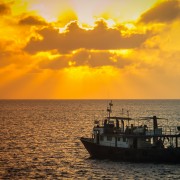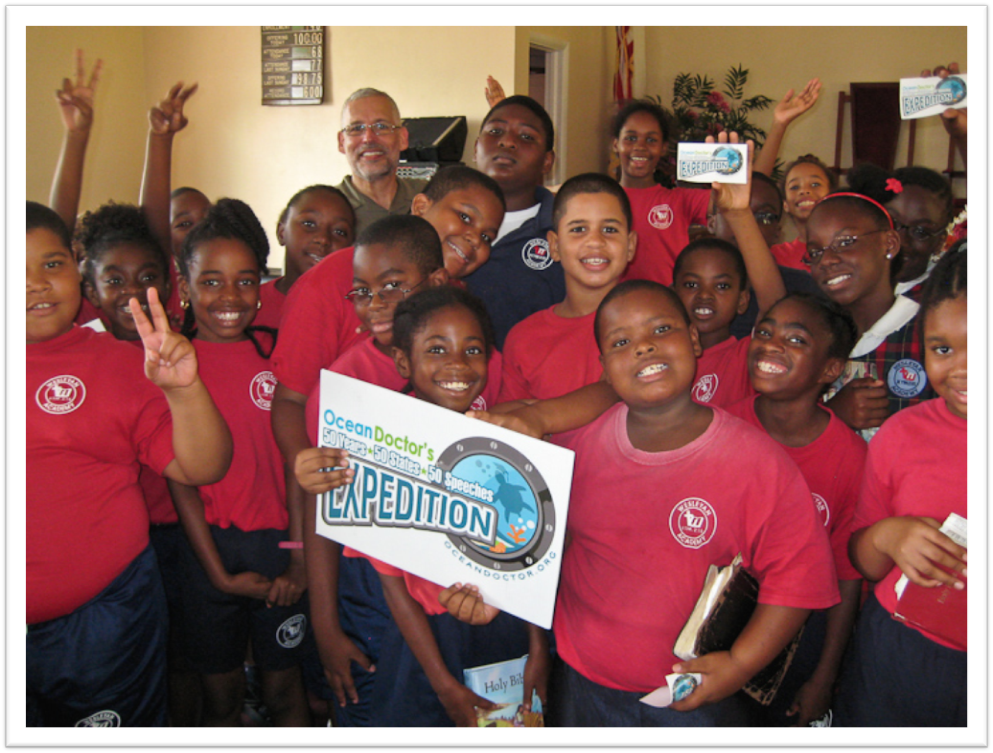50 States – Leg 2: Florida – Oceans vs. Rocky Horror
 |
Leg 2 was going far too smoothly. My flight to Tampa was early. The rental car bus arrived immediately. I didn’t get lost. The sun was shining. Maybe you’re like me, but when things start going this well, I get nervous. Turns out my gut feelings were right. Things were about to get…silly.
Like the expedition’s first leg to California, Leg 2 was also to familiar territory, to a state I had once called home: Florida. My many years in Florida, teaching at Seacamp in the Florida Keys, as president of The Conservancy of Southwest Florida in Naples, and co-chair of the Everglades Coalition, means that I’ll be returning here twice more to honor the flood of speaking requests I was honored to receive.
 |
I hadn’t seen Kelly Samek in several years, since she had been the organizer of the Public Interest Environmental Conference (PIEC) at the University of Florida’s Levin College of Law. PIEC is a remarkable event, now in its 15th year, where attorneys and other professionals from around the state and beyond gather to shed their pinstripes, roll up their sleeves, and speak with brutal honesty and fervent passion about protecting what’s most special about Florida — its incredible natural heritage. PIEC is also admired for its notable parties, some of which are reminiscent of hippie days gone by. I was honored to be keynote speaker at PIEC several years ago, but the highlight for me was meeting author, Carl Hiaason, whose acid humor has done as much to raise awareness about Florida’s treasured environment and outrageous politics as any advocacy group.
|
Leg 2: Sarasota, Florida
|
View Larger Map |
Kelly had since gone to Tallahassee and was working for the Florida Department of Environmental Protection (DEP) in the Office of General Counsel, working on the front lines of land use law and endless controversial issues spawned as greed and backhoes continued to collide with cypress and woodstorks against the backdrop of the largest environmental restoration ever attempted in human history: The $10 billion restoration of the Everglades. Overworked and underpaid, Kelly was as energetic and optimistic as I remembered her, still sporting her good natured sense of humor, including the delightful shark badge riding on the back of her Toyota.
We spoke by cell phone as I made my way to the teaching auditorium, which I found was still occupied 20 minutes before show time. The news from Kelly wasn’t good: "The auditorium is double-booked." Turns out she was only half correct. It was actually quadruple-booked! It had been many years, but based on the shouting, jumping and hand waving I was seeing through the crack in the doors, I was pretty sure I was witnessing a Friday evening screening of the Rocky Horror Picture Show. A young student approached and told me she was supposed to be screening the Hitchcock classic, Dial M for Murder in the same room. And I learned later that some sort of circus program also laid claim to the room. My watch indicated 15 mintues before 7pm, our scheduled show time. In 2007 I had given an impromptu PowerPoint presentation to fishermen at the Dutch Harbor (Alaska) Airport, holding my laptop above my head — hopefully this wouldn’t be the case again here.
My new Hitchcock friend disappeared into the darkened room to see if she could plead my case. Miraculously, I saw the fluorescent lights illuminate a few moments later, and she emerged, telling me that the Rocky Horror folks would take their performance elsewhere. And so would she. In moments, the hall was empty, with 10 minutes to spare! The circus group never arrived, but fortunately Kelly and our attendees did, a wonderful mix of Kelly’s Coastal Law and Policy and other students from New College, along with senior volunteers from nearby Mote Marine Laboratory, an organization I have worked closely with for decades, including our current work in Cuba.
I wrestled with a rat’s nest of unfamiliar wires and managed to get an image on the screen. The projector was so weak that it was necessary to kill every light to make it visible to the audience. "Actually, this is appropriate." I said, thanking the audience for their patience as the program finally started, "Most of the planet’s life lives in the oceans, and most of it lives in complete darkness." As latecomers stumbled through the aisles, feeling their way to find their seats, I launched into an hour-long presentation.
 |
When the lights painfully came back on, I was happy to see the size of the audience had grown and no one was asleep. This was a group that knew its stuff about the oceans — the Gulf was practically within spitting distance. Students asked me questions about coastal issues, and we talked about how in Florida, land and water are inextricably linked…what happens on land ultimately expresses itself in Florida’s coastal waters. And I was delighted to speak with a student named Catie, who is deeply inspired about the oceans. I told her about the newest partner to "join" the expedition, Our World – Underwater Scholarship Society, which awards incredible scholarships to college-aged students (freshman to recent graduates) to travel the world for a year studying with the A-list of ocean experts.
Kelly and I had a chance to catch up afterwards, and here again, another of my colleagues in the environmental world, overflowing with tireless commitment and dedication, was using her vacation time to advance the cause, in this case teaching Coastal Law and Policy at New College. How lucky her students are, and how lucky all of us are that even in tough times, such a spirit endures. During my introduction, I told the Mote volunteers how much I missed the hundreds of volunteers I worked along side of at The Conservancy of Southwest Florida. As with many nonprofits, it truly would have been impossible to do anything without them. One of the attributes of the U.S. that the world marvels at is the strength of our volunteerism, and I expect that as we forge through difficult months ahead, we’ll see even more clearly just how important the strong hand and caring heart of the volunteer is to all of us.




Leave a Reply
Want to join the discussion?Feel free to contribute!